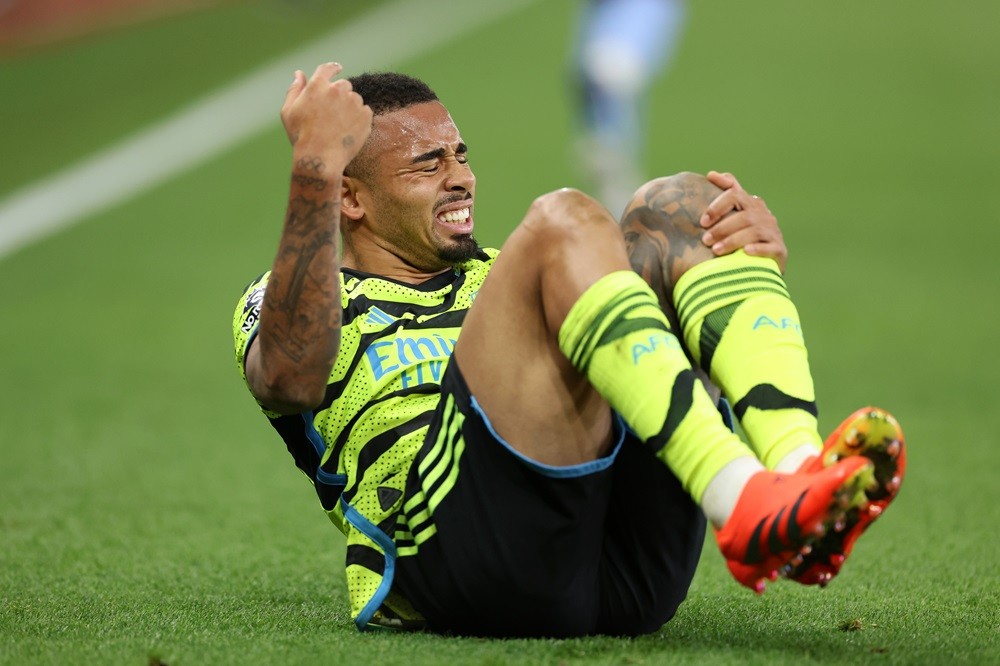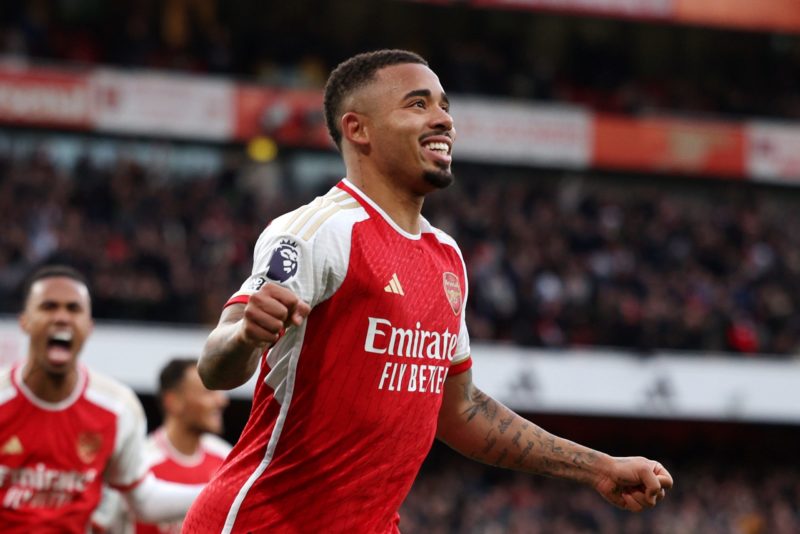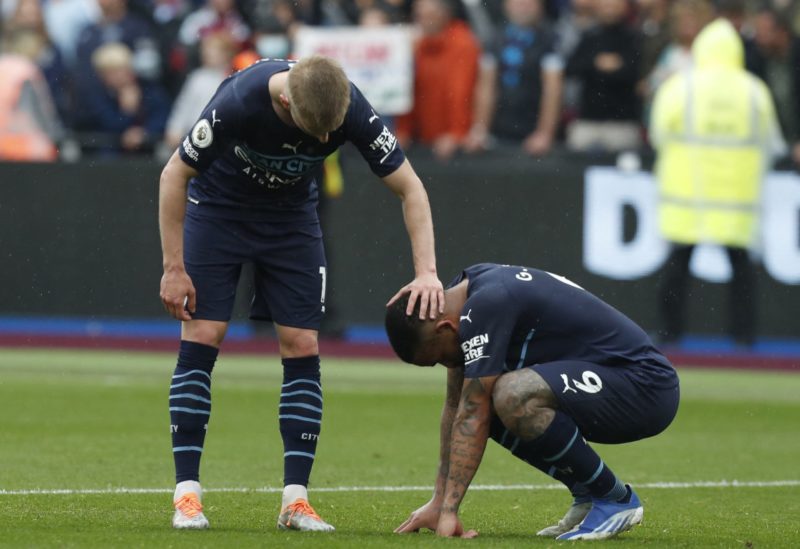Arsenal fans are understandably anxious about the status of Gabriel Jesus and the recurring knee issues that have plagued him.
The Gunners are carefully managing his recovery as they chase the Premier League title, but the club is also actively pursuing a new striker for the summer transfer window.

Arsenal will be carefully managing Gabriel Jesus‘ return to action to avoid aggravating his persistent knee problems as the season reaches its crucial final stages.
The Gunners striker hasn’t been on the pitch since January 30 due to a knee issue, although he was an unused substitute in Saturday’s victory against Newcastle. While Jesus is eager to return to competitive action, Mail Sport reveals that Arsenal‘s medical staff is taking a conservative approach with his workload to prevent his chronic knee complaint from worsening.
“Jesus has suffered with fluid in the knee, and it is a situation that needs attention in between games,” reported Sami Mokbel in the Mail.
The Brazilian star’s knee problems have unfortunately been a recurring theme since he signed with Arsenal ahead of last season. His injury history is a key reason why the club plans to bring in a new central striker this summer. Potential targets include Ivan Toney, Victor Osimhen, Joshua Zirkzee, and Viktor Gyokeres.
Arsenal also plan to strengthen their midfield during the transfer window, with Martin Zubimendi a primary target. And the club will explore adding a true winger for depth behind Bukayo Saka and Gabriel Martinelli.
In other injury news, Arsenal fans will be happy to hear that Takehiro Tomiyasu and Oleksandr Zinchenko could both be back for Monday’s trip to Sheffield United after recovering from injury.
Thomas Partey, who underwent groin surgery, is also nearing a full return after getting back into training.
Knee injuries in football and recovery time frames

Gabriel Jesus has been sidelined due to a knee injury during Arsenal‘s title charge. The Gunners striker was an unused substitute in their impressive win over Newcastle. A source explained that Jesus has an issue with fluid around the knee, a common problem for a footballer.
Knee injuries are common in football due to the intensity of the sport. Quick turns, sudden changes of direction, and forceful tackling can all lead to trauma and strain on the knee joints.
Recovery time from a knee injury depends on the severity, ranging from weeks to months, or even requiring surgery in some cases.
What is fluid on the knee?
Synovial Fluid: The knee joint naturally contains a small amount of synovial fluid, which acts as a lubricant. However, excessive fluid buildup within the knee joint is known as a knee effusion, or “water on the knee”.
This can cause swelling, pain, and stiffness.
Why do footballers get fluid on the knee?
Footballers are especially susceptible to knee injuries and fluid buildup due to the nature of the sport:
Overuse: The repetitive motions like running, kicking, jumping, and pivoting can irritate the knee joint, causing inflammation and increased synovial fluid production.
Direct trauma: Tackles, collisions and falls can lead to direct damage to the knee joint, ligaments, cartilage (meniscus), or bones, triggering swelling and fluid buildup.
Specific injuries: Conditions like ligament tears (ACL, MCL), meniscus tears, and bursitis (inflammation of the fluid-filled sacs around the knee) often lead to significant knee effusions.
How is it diagnosed?
Physical exam: A doctor will assess swelling, range of motion, and pain.
Imaging: X-ray to rule out fractures. MRI or ultrasound to assess damage to soft tissues (ligaments, meniscus, cartilage).
Aspiration: In some cases, your doctor may withdraw a sample of the fluid to analyze for infection or signs of inflammation.
Treatment and management for footballers
- Rest, Ice, Compression, Elevation (RICE): Initial management for reducing swelling and pain.
- Medication: Nonsteroidal anti-inflammatory drugs (NSAIDs) to reduce pain and inflammation.
- Physical therapy: Specific exercises to strengthen muscles around the knee joint and improve range of motion, critical for footballers.
- Aspiration: In cases of significant fluid buildup, the excess fluid may be drained with a needle for immediate relief.
- Surgery: If the underlying cause is a severe ligament tear or cartilage damage, surgery may be necessary.
Prevention
While some injuries are unavoidable, footballers can reduce their risk of fluid on the knee by:
- Proper warm-up and cool-down
- Strength training to build supporting leg muscles
- Flexibility exercises
- Good technique to minimize strain on joints
- Appropriate rest periods to avoid overuse
Gabriel Jesus’s Arsenal injury history

Gabriel Jesus’s Arsenal tenure has been a frustrating tale of potential interupted. The Brazilian’s bursts of brilliance, showcasing his clinical finishing and relentless work ethic, have repeatedly been derailed by injuries. The statistics tell a bleak tale: five separate injury absences in just two seasons, all but one related to that troublesome knee.
His most recent knee issue in February has already kept him sidelined for nearly a month, a worrying echo of the extended layoff he endured in December 2022 and into March 2023. Even during this current season, niggling problems have repeatedly crept up – the hamstring strain in October, another knee flare-up in August. This pattern of recurring injuries casts a long shadow of doubt over his ability to stay fit for the gruelling demands of a Premier League campaign.
Jesus’s persistent injuries highlight a harsh truth for Arsenal. Their key striker, brought in to elevate the attack, has become a frustratingly unpredictable asset. His absence leaves a gaping hole in the team’s frontline, although Mikel Arteta has found a way to combat his absence.
These repeated absences expose the limitations of Arsenal’s squad. The lack of a top-tier backup option puts immense pressure on Jesus to return before fully fit, potentially exacerbating his injury problems. This cycle must be broken.
As Arsenal’s decision-makers look towards the summer transfer window, Jesus’s chronic injuries raise serious concerns. While his talent is undeniable, his body’s apparent fragility is equally stark. The club needs a reliable goal threat to share the burden and allow Jesus the necessary time to fully heal, both physically and mentally.
Signing a high-quality, durable striker is not a luxury – it’s a necessity if Arsenal wants to sustain their hopes for silverware.

